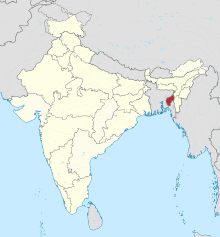
Tripura
Tripura is a state in Northeast India. The third-smallest state in the country, it is bordered by Bangladesh to the north, south, and west, and the Indian states of Assam and Mizoram to the east. Its capital city is Agartala.
Quotes
- It is, indeed unfortunate that Tripura, despite its age—old tradition, culture, natural wealth, beautiful landscape and archaeological treasures failed to attract the attention of the rest of the country. Only when the staccato of gunshots reverberated from the hills, Tripura attracted the world's attention. As the state slowly emerged from obscurity due to blood spilling tribal militancy to become a flash point of the South Asian conflict zone, people outside the region now could at least recognize the name—Tripura. But, still, Tripura to them meant—and perhaps continues to mean——-a land of tribal guerrillas where killing and kidnapping is the order of the day. For them Tripura is a place with high hills, rugged terrains and deep forests where death lurks in every road, at every bend. It is when you tell them that this is the place where literacy is more than 80 percent, where ONGC is now setting up its first mega power project or when you remind someone that music maestro Sachin Dev Burman actually hailed from the Royal family of this state and was a 'tribal' in ethnic sense or it is the Tripura king who first recognized Rabindranath Tagore in his teen, you will find a shade of amazement flashing across their eyes.
- Manas Paul (2009). The Eyewitness: Tales from Tripura's Ethnic Conflict. Lancer Publishers. pp. 1-2. ISBN 978-1-935501-15-2.
- “Tipara is a country extremely strong… The Raja is proud of his strength and the practice of conch-blowing and idol-worship prevailed there…“Murshid Qulî II decided to conquer Tipara and put down idolatry there. He wrote to Sayyid Habibullah (the Commander-in-Chief), Md. Sadîq, Mir Hãshim, Shaikh Sirãjuddin Md., and Mahdi Beg who were then engaged in the Chittogong expedition, that… they should set out with their forces, observing every precaution, arrive close to the Kingdom of Tipara, and try to conquer it…”“The Tipara soldiers did not fail to fight regardless of death. The Muslim troops invested the fort from four sides. A severe battle was fought. The zamindar’s men lay dead in heaps. The victors entered the fort… The flag of Murshid Quli Khan was unfurled on the top of fort Udaipur. The Muslims raised the cry of Allahu-ãkbar and the Muslim credo (There is no deity except Allah and Muhammad is His messenger), and demolished the temple of the zamindar which had long been the seat of idol-worship. Making a level courtyard on the side of the temple, they read the Khutba in the Emperor’s name… The world-illuminating sun of the faith of Muhammad swept away the dark night of infidelity, and the bright day of Islam dawned.”
- About Nasiru’d-Dîn Muhammad Shãh Bahãdur Pãdshãh Ghãzî (AD 1719-1748) conquest of Udaipur (Tripura). Nau-Bahãr-i-Murshid Qulî-Khãnî Nau-Bahãr-i-Murshid Quli-Khãni, translated into English by Jadu Nath Sarkar and included in his Bengal Nawãbs, Calcutta Reprint, 1985, p. 4-7
External links
This article is issued from
Wikiquote.
The text is licensed under Creative
Commons - Attribution - Sharealike.
Additional terms may apply for the media files.